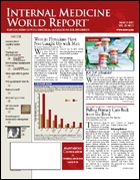Immunotherapy for Men with Hormone-refractive Prostate Cancer
Immunotherapy for Men with Hormone-refractive Prostate Cancer
ORLANDO—Patients with metastatic prostate cancer who fail to respond to hormonal therapy may benefit from a novel immunologic approach, investigators reported at the 2005 Multidisciplinary Prostate Cancer Symposium. In a phase 3, randomized, placebo-controlled
trial of 127 patients, APC8015 (Provenge; Dandreon) was found effective n prolonging survival by nearly 18%. Lead investigator Eric J. Small, MD, of the University of California, San
Francisco, said this is “the first study to demonstrate a survival benefit from immunologic
therapies or vaccines in patients with advanced prostate cancer… a therapy that prolongs life yet avoids the side effects of other therapeutic approaches, [making it] clearly attractive to patients and physicians alike.” APC8015 stimulates the patient’s own immune system to recognize and attack cells that express prostatic acid phosphatase (PAP), a protein present in nearly 95% of all prostate cancer cells. The substance is obtained from the patient’s blood by pheresis to isolate the immune cells, which are then stimulated to seek out and destroy PAP as if it were an invader.
Dr Small reported that 82 men with hormone-refractive but otherwise asymptomatic
metastatic prostate cancer were intravenously infused at 2-week intervals
with 3 doses of APC8015 and were then followed for 3 years. Mild flulike symptoms
that responded to acetaminophen (eg, Tylenol) were the only side effect.
Overall survival in the treated group was 25.9 months, compared with 22 months
among the 45 patients in the placebo group. Philip Kantoff, MD, of the Dana-Farber
study of APC8015 was proof that the vaccine approach in prostate cancer works in
advanced disease. He is concerned, however, about the small study size, because there
is a greater chance for error as a result of an imbalance in individual characteristics. To
demonstrate significant differences in outcome requires hundreds, if not thousands,
of patients, he said.
